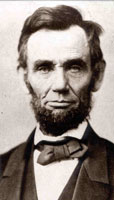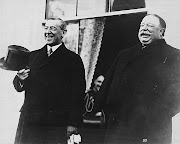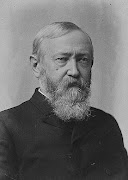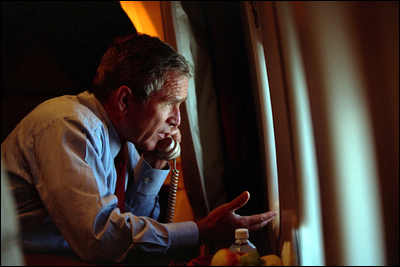While I'm finishing my McKinley essay, a decided to put up a list of some of the key takeaways from eac president. Here's part 1.
George Washington
The first president served the country ably and admirably, both as the figurehead leader and the functional president. Although naïve in thinking he could avert the formation of political parties, he performed the greatest act that any leader has ever done in modern history: rather than become king for life, he permanently walked away from power and became a private citizen once more.
John Adams
Adams the president deserves a place almost equal to Adams the founding father. His political theories, which he put into practice as president, helped assure that the United States would be a democratic-republic, and not just the “for the people” democracy that the Jeffersonians thought that they wanted. And Jefferson unwittingly owed the success of his presidency to the very political philosophy that he repeatedly attacked in Adams!
Thomas Jefferson
Despite the fact that Jefferson did not want his presidency remembered—at least as an accomplishment—Jefferson moved the presidency and the nation forward in many positive ways. The idea that the United States government was one for the common man is certainly his most endearing contribution: Lincoln drew upon it in the nation’s darkest hour, FDR used it to contrast liberty with fascism, and many a politician today claims to speak “for the people.” The idea that local government should have more control of affairs than a central government still resonates as well—especially among modern-day conservatives—despite the seeming discredit of states’ rights in 1865.
James Madison
Madison wasn’t that great of a president, but he was a steady one. Choices of incompetent cabinet officers—and retaining them after the war began—and the utter lack of real direction in the early stages of the war hurt him and the country. But Madison rose to the occasion, and corrected his deficiencies. He never panicked. And that itself is key. Bad things often happen when presidents act out of haste instead of deliberation.
James Monroe
The fifth president a hard-working man who was fully aware of his limitations and worked well within those boundaries. Once he set his mind to a task, he accomplished it. He wasn’t afraid to surround himself with brilliant men (Crawford, J. Q. Adams, Calhoun), seek the advice of his mentor friends (Jefferson and Madison) and reject their advice when he made his decisions. He had the courage of his convictions, and never appeared wishy-washy on anything. Monroe also had a strong grasp of the Constitution, his executive powers and limits, and an equally strong grasp of foreign affairs. He was an excellent communicator in that he kept on top of letters, correspondence, orders, bills, etc. Overall, Monroe is a model for steady leadership and the recognition of limitations.
John Quincy Adams
The younger Adams should stand as the model of what not to do when trying to become president. Do not make bargains with political allies that could—or will—backfire on you massively, causing your time in office to be one continual battle against knee-jerk reactionaries. The “corrupt bargain” of 1828 killed Adams’ presidency before it even started, more so than his dismal performance in office. On a brighter note, J.Q. Adams’ career attests to the fact that, post-presidency, men can go on to even greater things.
Andrew Jackson
Jackson was the first truly strong president and had his way throughout his presidency, largely through stubbornness. He should stand as an example of heavy-handed bluntness AND the king of unintended consequences. His personal war with Nicholas Biddle precipitated the Panic of 1837—right after he left office. His strong stance against disunion inspired Lincoln and Fillmore.
Martin Van Buren
Martin Van Buren had the unfortunate luck to become president just when the nation entered severe economic crisis. His presidency never fully recovered from the Panic of 1837. He also stands as proof that brilliant political organizers do not necessarily make strong presidents.
William Henry Harrison
Harrison never had a chance to prove himself as president, but he left an indelible mark: the popular presidential campaign, with rallies, singing, stunts and mass media overload.
John Tyler
The nation owes John Tyler a debt of gratitude for firmly establishing the constitutional right of presidential succession. The vice president became president, not a mere cipher for the cabinet or the Senate.
James K. Polk
James Polk stands as the archetype of the president who accomplished every single one of his goals before leaving office. He’s also proof that you don’t have to be a likable man to obtain high office or govern effectively.
Zachary Taylor
The underrated Zachary Taylor went against his slave-holding class to reach a compromise between increasingly antagonistic sections. Like his successor, he believed in reaching amicable solutions but laying a firm demarcation line between unsavory ambitions and following the rule of law.
Tuesday, March 24, 2009
Key takeaways from Numbers 1 through 24 (part 1)
Subscribe to:
Post Comments (Atom)








7 comments:
Post a Comment